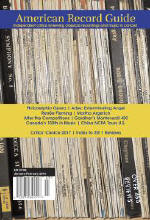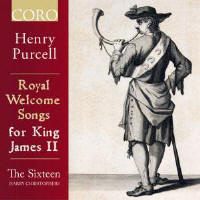|
Reviewer: William
J. Gatens
This is part of a
Purcell series from Harry Christophers and The Sixteen. Each program in the
series will be built around one or two of the composer’s welcome songs. New
Grove lists 9 such pieces: 5 for Charles II, 1 for the Duke of York before
he succeeded his brother as king, and 3 for James II as king. It was the
custom for British monarchs to spend the summer at Windsor and return to
London in October. The welcome songs are odes written for the court’s annual
return to the capital. The two examples here are Ye Tuneful Muses, Raise
your Heads (1686) and Sound the Trumpet, Beat the Drum (1687) for James II.
His birthday was October 14, so the welcome songs did double duty as
birthday odes. It is hardly surprising that the words for these compositions
were the work of court poets and consist chiefly of fawning flattery of the
monarch and his queen. The poetry is mediocre at best, but Purcell could
have produced magnificent music for a laundry list, and his contribution far
surpasses the quality of the verse. Among the shorter pieces are two early
ones from an autograph manuscript that may have served as a portfolio of the
composer as he approached his 21st birthday. They are the familiar Chacony
in G minor and the sacred song for three voices and continuo ‘When on my
Sick Bed I Languish’, a poetic contemplation of approaching death with words
from Thomas Flatman’s Poems and Songs (1674). Also fairly early are the
seven-part canon ‘God is Gone Up’ and the anthem ‘Save me, O God’. In his
notes to this recording, Andrew Pinnock describes the political and
religious turmoil that swirled around the brief reign of James II. With all
their overblown flattery, the welcome songs were essentially political
statements, even if they were little more than a professional obligation for
Purcell. Perhaps more indicative of the composer’s real sentiments is the
three-part catch ‘True Englishmen Drink a Good Health’ (1688, but not
published until 1701), which celebrates the acquittal of seven Anglican
bishops who were imprisoned in the Tower of London for declining to read
publicly a Declaration of Indulgence commanded by the king. There was also a
political dimension to the popularity of Irish and Scottish music at the
time, here reflected in ‘A New Irish Tune in G’ (Lilliburlero) and ‘A New
Scotch Tune in G’ played on the harpsichord by Alistair Ross. As we have
come to expect from Harry Christophers and The Sixteen, the performances are
technically superb. The forces are somewhat slim: 8 singers, 12 string
players, 2 recorders, and a continuo ensemble of theorbo, harp, and keyboard
(organ or harpsichord). The solo singers may not yet be international
celebrities in the early-music world, but they demonstrate a remarkable
affinity for the style of this music, combining purity of tone with the
lightness and agility the repertory demands. At some point in the recording,
each singer gets a solo or a part in a small ensemble. Bass Stuart Young has
the daunting task of singing solos originally written for John Gostling, a
Gentleman of the Chapel Royal who had an extraordinarily wide range and was
particularly famous for his low notes. From 1988 to 1992 Robert King and the
King’s Consort recorded all of Purcell’s odes and welcome songs for
Hyperion. I have long regarded them as the benchmark for this repertory.
The present recording stands up well beside them, but where there is a
difference in interpretation I most often find King preferable. For example,
in the first section of the opening symphony of Sound the Trumpet,
Christophers takes a rather deliberate tempo, and before long I find the
persistent over-dotted rhythms annoying. King takes a quicker tempo with a
lighter touch that I find more agreeable. My only complaint is that the
present recording seems excessively close, and turning down the volume does
not entirely make things better. The ear eventually adjusts to it, but I
prefer the more spacious sound of King’s recordings. It is not only
pleasanter to the ear, but it tends to mitigate the few but inevitable
imperfections or such things as the aggressive strumming of the theorbo
towards the end of the chaconne in Sound the Trumpet. This is certainly not
the first venture into the works of Purcell from Christophers and The
Sixteen. The back cover of the booklet reminds us of their recordings of The
Indian Queen (Coro 16129; S/O 2015) and The Fairy Queen (Coro 16005; M/A
2003). My colleagues were favorably impressed with them, but both remarked
on the small forces compared with other recordings of the same music.
Fermer la fenêtre/Close window
|




